Literature
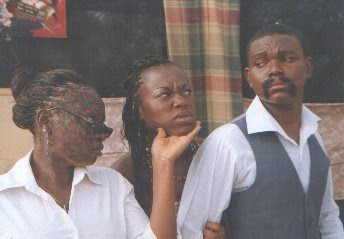 Despite the curfew imposed on the city of Jos, Plateau State, by the state government following the November 2008 sectarian violence, the Jos Repertory Theatre, JRT, still managed to make the best out of the tight situation, successfully holding its annual theatre festival - the Jos Festival of Theatre.
Despite the curfew imposed on the city of Jos, Plateau State, by the state government following the November 2008 sectarian violence, the Jos Repertory Theatre, JRT, still managed to make the best out of the tight situation, successfully holding its annual theatre festival - the Jos Festival of Theatre.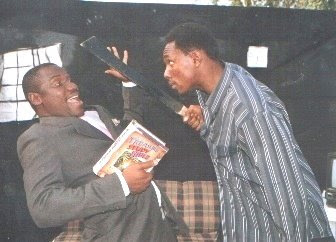 The festival, which is the fifth since it debut in 2004, took place from 20th to 29th March, 2009, at Alliance Francaise, opposite Standard Building located in the heart of the city.
The festival, which is the fifth since it debut in 2004, took place from 20th to 29th March, 2009, at Alliance Francaise, opposite Standard Building located in the heart of the city.
The ten-day event featured seven plays, staged under tight schedules to beat the 9 pm curfew deadline. Instead of the usual 7 pm, each show began at about 5 pm and ended at 8 pm daily.
Due to the curfew, venue of the festival was also changed from Crest Hotel, Old Airport Road, to Alliance Francaise, to make it easier for people to get back home on time after the show.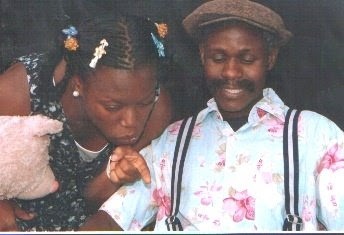 The choice of the plays for the festival was equally influenced by the crisis and its aftermath. From Athol Fugard?s Woza Albert, directed by Tunde Awosanmi, to Wole Soyinka?s The Trials of Brother Jero, directed by Austin Efe Okonkwo, the plays focus on the need for tolerance and peaceful co-existence irrespective of religious, ethnic or political differences. Even the new plays ? Spencer Okoroafor?s Visa to Nowhere and Phillip Begho?s Smallie ? are loud statements on the Jos experience.
The choice of the plays for the festival was equally influenced by the crisis and its aftermath. From Athol Fugard?s Woza Albert, directed by Tunde Awosanmi, to Wole Soyinka?s The Trials of Brother Jero, directed by Austin Efe Okonkwo, the plays focus on the need for tolerance and peaceful co-existence irrespective of religious, ethnic or political differences. Even the new plays ? Spencer Okoroafor?s Visa to Nowhere and Phillip Begho?s Smallie ? are loud statements on the Jos experience. 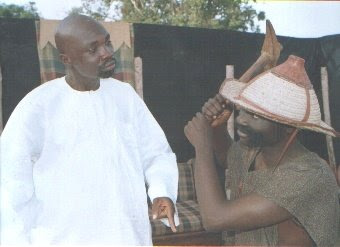 The festival was a dedication to the Jos crisis and at the same time a celebration of the Nigerian theatre and theatre practitioners. Every year, new plays are produced for the festival as the organizers call for play script entries prior to the event. Visa to Nowhere and Smallie emerged through this process. Interestingly, the plays were directed by new directors who gained their theatre experience through the JRT. They are Eucharia Egah and Wapi Barau, directing Visa to Nowhere and Smallie, respectively. Another new director is Emmanuel Degri, who has acted several plays including Biyi Bandele?s adaptation of Things Fall Apart by Chinua Achebe, and is well known for his brilliant acting. He directed Adinoyi Ojo Onukaba?s A Resting Place.
The festival was a dedication to the Jos crisis and at the same time a celebration of the Nigerian theatre and theatre practitioners. Every year, new plays are produced for the festival as the organizers call for play script entries prior to the event. Visa to Nowhere and Smallie emerged through this process. Interestingly, the plays were directed by new directors who gained their theatre experience through the JRT. They are Eucharia Egah and Wapi Barau, directing Visa to Nowhere and Smallie, respectively. Another new director is Emmanuel Degri, who has acted several plays including Biyi Bandele?s adaptation of Things Fall Apart by Chinua Achebe, and is well known for his brilliant acting. He directed Adinoyi Ojo Onukaba?s A Resting Place.
Other plays featured at the festival were Bose Ayeni-Tsevende?s Morning Yet Again, based on the book, U Are A Poet, written and choreographed by Bose Ayeni-Tsevende, and Jean Paul Sarte?s No Exit, directed by the festival producer, Mr. Patrick-Jude Oteh and supported by the French Cultural Centre, Abuja.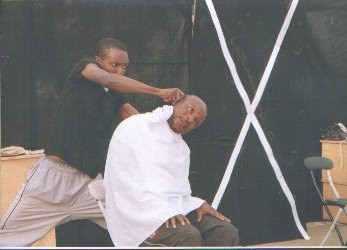 The colourful event, which was mainly sponsored by the Ford Foundation, came to a close with a pledge by the organizers to do it again next year and subsequent years.
The colourful event, which was mainly sponsored by the Ford Foundation, came to a close with a pledge by the organizers to do it again next year and subsequent years.
JRT was founded in November 1997 with the mission of promoting theatre culture in Nigeria and the vision to be the most successful and longest surviving private, independent theatre organization in the country. According to the founder and Artistic Director of the Jos-based theatre outfit, Mr. Oteh, the outfit has a big dream. "We are trying to create an unforgettable world theatre by utilizing the theatre to confront and challenge crucial issues which affect our society with the ultimate aim of educating and entertaining audiences."
Indeed, the organisation is already achieving some of its noble objectives through various activities, prominent among which is the annual theatre festival. To date, it has organized and participated in over sixty events, nationally and internationally, featuring famous plays like Shakespeare?s Macbeth and Soyinka?s The Lion and the Jewel. The events include MUSON Festival in Lagos (2000), the 8th All Africa Games in Abuja (2003) and the 16th National Sports Festival, Kaduna (2009). The international engagements include theatre related activities in Sierra Leone, Kenya, South Africa Cote d?voire, Italy, the United States of America, and the United Kingdom.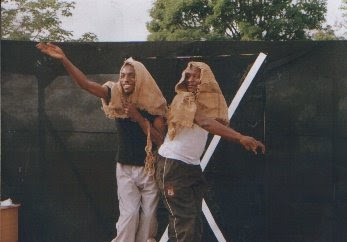 As a result of its vibrant activities over the years, JRT has not only become a nurturing ground for new playwrights, actors, actresses and directors but a centre for the development of the Nigerian theatre. And the just concluded festival is a screaming testimony to the fact.
As a result of its vibrant activities over the years, JRT has not only become a nurturing ground for new playwrights, actors, actresses and directors but a centre for the development of the Nigerian theatre. And the just concluded festival is a screaming testimony to the fact.
SCENES FROM:
1. No Exit
2. A Visa to Nowhere
3. Smallie
4. A Resting Place
5. Woza Albert
6. Woza Albert
Reported by SUMAILA UMAISHA and published in the 4/4/09 edition of New Nigerian newpaper.
- Jrt And Theatre Promotion In Nigeria
Of the three main genres of literature, drama is the most practicable. Unlike poetry and prose that are mainly read and hardly performed, plays are meant to be performed. That is why the playwright goes the extra mile to ensure that whatever he has...
- National Sports Festival As Cultural Showcase (report & Photos)
The National Sports Festival holding in Kaduna (15th ? 25th February, 2009) is a proof of the fact that the biennial event is not just about sports but also about arts and culture, as various activities portraying Nigeria?s rich cultural heritage were...
- Sports And Culture As Tools For National Development
As Kaduna hosts the 16th National Sports Festival taking place from 15th to 25th February, 2009, SUMAILA UMAISHA examines the synergy between sports and cultre in relation to their roles in the development of Nigeria. Many people regard sporting activities...
- Promoting The Nigerian Pidgin English
The Nigerian Pidgin English has an ironic stigma that even language experts find difficult to understand. It is the most widely spoken language, the only unbiased lingua franca with interjections of many indigenous languages across the country, and it...
- Patrick-jude Oteh - 'there?ll Be More Theatre Outfits In The North' (interview)
A conference aimed at raising awareness on how to harness the untapped resources in the arts, culture and heritage areas of our national life was held from 13th to 16th November, 2007, by the Development Alternative Resource Centre in collaboration with...
Literature
Jos Festival of Theatre holds... in the face of curfew
 Despite the curfew imposed on the city of Jos, Plateau State, by the state government following the November 2008 sectarian violence, the Jos Repertory Theatre, JRT, still managed to make the best out of the tight situation, successfully holding its annual theatre festival - the Jos Festival of Theatre.
Despite the curfew imposed on the city of Jos, Plateau State, by the state government following the November 2008 sectarian violence, the Jos Repertory Theatre, JRT, still managed to make the best out of the tight situation, successfully holding its annual theatre festival - the Jos Festival of Theatre. The festival, which is the fifth since it debut in 2004, took place from 20th to 29th March, 2009, at Alliance Francaise, opposite Standard Building located in the heart of the city.
The festival, which is the fifth since it debut in 2004, took place from 20th to 29th March, 2009, at Alliance Francaise, opposite Standard Building located in the heart of the city.The ten-day event featured seven plays, staged under tight schedules to beat the 9 pm curfew deadline. Instead of the usual 7 pm, each show began at about 5 pm and ended at 8 pm daily.
Due to the curfew, venue of the festival was also changed from Crest Hotel, Old Airport Road, to Alliance Francaise, to make it easier for people to get back home on time after the show.
 The choice of the plays for the festival was equally influenced by the crisis and its aftermath. From Athol Fugard?s Woza Albert, directed by Tunde Awosanmi, to Wole Soyinka?s The Trials of Brother Jero, directed by Austin Efe Okonkwo, the plays focus on the need for tolerance and peaceful co-existence irrespective of religious, ethnic or political differences. Even the new plays ? Spencer Okoroafor?s Visa to Nowhere and Phillip Begho?s Smallie ? are loud statements on the Jos experience.
The choice of the plays for the festival was equally influenced by the crisis and its aftermath. From Athol Fugard?s Woza Albert, directed by Tunde Awosanmi, to Wole Soyinka?s The Trials of Brother Jero, directed by Austin Efe Okonkwo, the plays focus on the need for tolerance and peaceful co-existence irrespective of religious, ethnic or political differences. Even the new plays ? Spencer Okoroafor?s Visa to Nowhere and Phillip Begho?s Smallie ? are loud statements on the Jos experience.  The festival was a dedication to the Jos crisis and at the same time a celebration of the Nigerian theatre and theatre practitioners. Every year, new plays are produced for the festival as the organizers call for play script entries prior to the event. Visa to Nowhere and Smallie emerged through this process. Interestingly, the plays were directed by new directors who gained their theatre experience through the JRT. They are Eucharia Egah and Wapi Barau, directing Visa to Nowhere and Smallie, respectively. Another new director is Emmanuel Degri, who has acted several plays including Biyi Bandele?s adaptation of Things Fall Apart by Chinua Achebe, and is well known for his brilliant acting. He directed Adinoyi Ojo Onukaba?s A Resting Place.
The festival was a dedication to the Jos crisis and at the same time a celebration of the Nigerian theatre and theatre practitioners. Every year, new plays are produced for the festival as the organizers call for play script entries prior to the event. Visa to Nowhere and Smallie emerged through this process. Interestingly, the plays were directed by new directors who gained their theatre experience through the JRT. They are Eucharia Egah and Wapi Barau, directing Visa to Nowhere and Smallie, respectively. Another new director is Emmanuel Degri, who has acted several plays including Biyi Bandele?s adaptation of Things Fall Apart by Chinua Achebe, and is well known for his brilliant acting. He directed Adinoyi Ojo Onukaba?s A Resting Place.Other plays featured at the festival were Bose Ayeni-Tsevende?s Morning Yet Again, based on the book, U Are A Poet, written and choreographed by Bose Ayeni-Tsevende, and Jean Paul Sarte?s No Exit, directed by the festival producer, Mr. Patrick-Jude Oteh and supported by the French Cultural Centre, Abuja.
 The colourful event, which was mainly sponsored by the Ford Foundation, came to a close with a pledge by the organizers to do it again next year and subsequent years.
The colourful event, which was mainly sponsored by the Ford Foundation, came to a close with a pledge by the organizers to do it again next year and subsequent years.JRT was founded in November 1997 with the mission of promoting theatre culture in Nigeria and the vision to be the most successful and longest surviving private, independent theatre organization in the country. According to the founder and Artistic Director of the Jos-based theatre outfit, Mr. Oteh, the outfit has a big dream. "We are trying to create an unforgettable world theatre by utilizing the theatre to confront and challenge crucial issues which affect our society with the ultimate aim of educating and entertaining audiences."
Indeed, the organisation is already achieving some of its noble objectives through various activities, prominent among which is the annual theatre festival. To date, it has organized and participated in over sixty events, nationally and internationally, featuring famous plays like Shakespeare?s Macbeth and Soyinka?s The Lion and the Jewel. The events include MUSON Festival in Lagos (2000), the 8th All Africa Games in Abuja (2003) and the 16th National Sports Festival, Kaduna (2009). The international engagements include theatre related activities in Sierra Leone, Kenya, South Africa Cote d?voire, Italy, the United States of America, and the United Kingdom.
 As a result of its vibrant activities over the years, JRT has not only become a nurturing ground for new playwrights, actors, actresses and directors but a centre for the development of the Nigerian theatre. And the just concluded festival is a screaming testimony to the fact.
As a result of its vibrant activities over the years, JRT has not only become a nurturing ground for new playwrights, actors, actresses and directors but a centre for the development of the Nigerian theatre. And the just concluded festival is a screaming testimony to the fact.SCENES FROM:
1. No Exit
2. A Visa to Nowhere
3. Smallie
4. A Resting Place
5. Woza Albert
6. Woza Albert
Reported by SUMAILA UMAISHA and published in the 4/4/09 edition of New Nigerian newpaper.
- Jrt And Theatre Promotion In Nigeria
Of the three main genres of literature, drama is the most practicable. Unlike poetry and prose that are mainly read and hardly performed, plays are meant to be performed. That is why the playwright goes the extra mile to ensure that whatever he has...
- National Sports Festival As Cultural Showcase (report & Photos)
The National Sports Festival holding in Kaduna (15th ? 25th February, 2009) is a proof of the fact that the biennial event is not just about sports but also about arts and culture, as various activities portraying Nigeria?s rich cultural heritage were...
- Sports And Culture As Tools For National Development
As Kaduna hosts the 16th National Sports Festival taking place from 15th to 25th February, 2009, SUMAILA UMAISHA examines the synergy between sports and cultre in relation to their roles in the development of Nigeria. Many people regard sporting activities...
- Promoting The Nigerian Pidgin English
The Nigerian Pidgin English has an ironic stigma that even language experts find difficult to understand. It is the most widely spoken language, the only unbiased lingua franca with interjections of many indigenous languages across the country, and it...
- Patrick-jude Oteh - 'there?ll Be More Theatre Outfits In The North' (interview)
A conference aimed at raising awareness on how to harness the untapped resources in the arts, culture and heritage areas of our national life was held from 13th to 16th November, 2007, by the Development Alternative Resource Centre in collaboration with...
